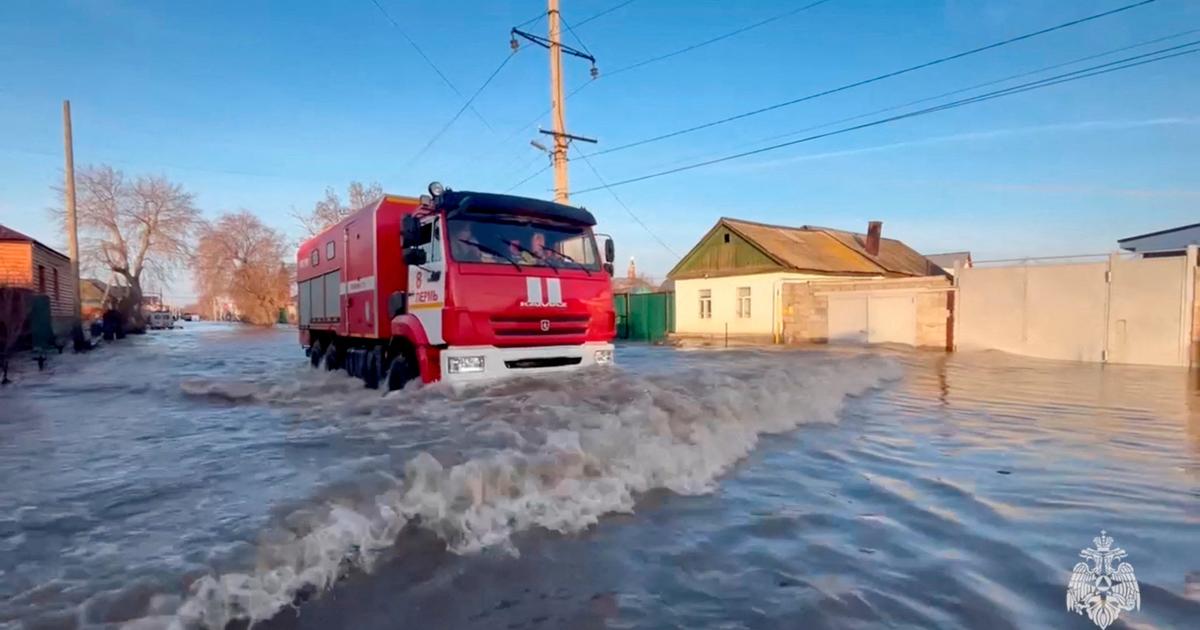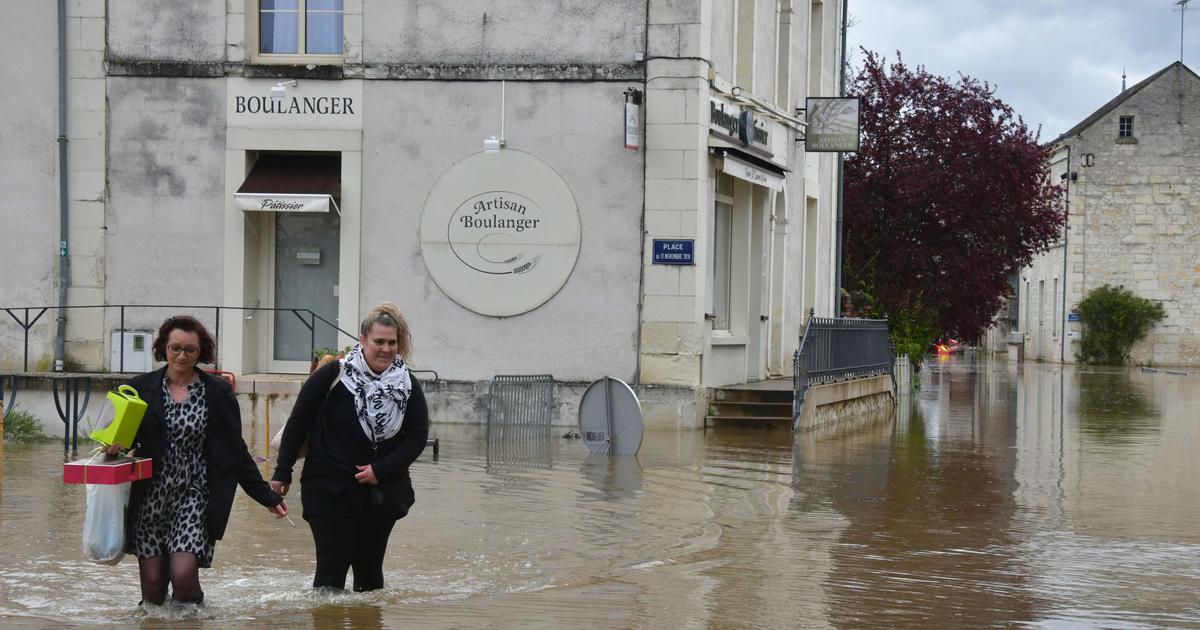Enlarge image
Hagen: Bundeswehr soldiers help with a Dachs engineer tank
Photo: Julian Stratenschulte / dpa
In some places of the devastating flood, the water is slowly receding - but the death toll is still rising.
And the danger is not over after the flood disaster in the west of the Federal Republic.
A total of 106 fatalities were counted by Friday evening - according to official information, at least 63 people were killed in Rhineland-Palatinate and 43 in North Rhine-Westphalia. In both federal states, many people were also missing, their exact number is unclear.
In the flooded areas, the rescue and clean-up work continued on Friday.
With water levels falling in some places and less rain, there were signs of some relaxation.
A particularly dramatic situation arose on Friday in Erftstadt-Blessem southwest of Cologne: There were huge landslides there, and craters formed in the ground.
As of Friday evening, three houses and part of the historic castle collapsed.
It was unclear how many victims there were.
The responsible district administrator, Frank Rock, said on the television channel n-tv that 50 people had been rescued by boats.
According to the Federal Office for Population and Disaster Management (BBK) in Bonn, 23 cities and districts are affected by floods in North Rhine-Westphalia. In Rhineland-Palatinate, the Ahrweiler district is the focus of the disaster. At least 362 people were injured here, as the police in Koblenz announced on Friday. In the village of Schuld an der Ahr alone, with 700 inhabitants, several houses were swept away by the masses of water and numerous other buildings, some severely damaged. There was also considerable damage in other regions of the Eifel and in the Trier-Saarburg district.
Chancellor Angela Merkel (CDU) plans to travel to the affected region in Rhineland-Palatinate.
The spokesman for the federal government, Steffen Seibert, announced on Friday that she is in talks with the Mainz state government about an early visit to the disaster area.
Federal President Frank-Walter Steinmeier spoke of a tragedy.
"That stunned me," he said.
In his thoughts he was with the bereaved of the victims.
"Your fate hits me in the heart." As the State Chancellery of North Rhine-Westphalia announced, Steinmeier wants to visit the Rhein-Erft district on Saturday with the state's Prime Minister Armin Laschet (CDU).
Baerbock travels to the crisis areas
Laschet lamented a "flood disaster of historic proportions".
It is to be feared that the number of victims will continue to rise.
His colleague from Rhineland-Palatinate, Malu Dreyer (SPD), called the situation "still extremely tense in our state".
In Trier she added: "The suffering never ends."
Green Chancellor candidate Annalena Baerbock traveled to the crisis areas after breaking off her vacation.
As a spokeswoman announced on Friday evening, the party leader wants to find out about the situation of the people on site.
In doing so, she deliberately refrains from accompanying the press or making public appearances.
In western Germany, around 102,000 people were still without electricity on Friday afternoon.
The storm and the resulting flooding continued to cause failures in the power supply in North Rhine-Westphalia and Rhineland-Palatinate, said the E.on group-owned energy supplier Westenergie in Essen.
In addition to supporting emergency services from other federal states, around 900 soldiers are currently helping to cope with the disaster.
The main focus is on saving human lives, but the Bundeswehr also provides support with material, said the armed forces base in Bonn.
The Ministry of Defense had triggered a military disaster alert because of the emergency.
This means that decisions can be made more quickly by those responsible on site, according to a spokesman.
Rhineland-Palatinate provided 50 million euros as short-term support to repair damage to roads, bridges and other structures.
Prime Minister Dreyer said on ZDF that federal help was needed to rebuild the affected areas.
According to the Ministry of Finance, the federal government wants to decide next week on construction aid for citizens and municipalities.
Laschet announced a multi-stage aid program for the victims of the storm disaster in North Rhine-Westphalia.
"We will need great financial efforts," said the CDU head of government after the special meeting of his cabinet.
The funds available up to now for emergency aid in the event of heavy rain events would "by far not be sufficient".
Talks about participation by the federal government have already started.
In addition to help in cases of hardship for private individuals and companies, structural assistance for damaged roads and systems is necessary.
The state's financial administration implemented a disaster decree to relieve the citizens affected by the storm.
This means that business and private individuals can use special depreciation options for reconstruction.
Flags at half mast
To commemorate the victims of the severe weather disaster, the flags on numerous buildings in North Rhine-Westphalia are to be waved at half-mast until Monday.
NRW Interior Minister Herbert Reul (CDU) ordered mourning flags for all office buildings in the state, the municipalities and municipal associations on Friday.
In Rhineland-Palatinate, the flags at all authorities should be set to half-mast on Friday.
In view of the enormous damage, the state government in Rhineland-Palatinate set up a donation account for those affected. The chemical company BASF is donating one million euros to help in the affected flood regions, while the Catholic archbishopric of Paderborn and Cologne announced that they will donate 100,000 euros each. After a call by the city of Bonn to offer accommodation, offers of help were received for more than 1,000 people affected. The city of Cologne also provided accommodation for 80 people from Erftstadt at short notice.
In Baden-Württemberg, storms and floods also caused problems for people.
In some regions roads were again closed, in the Allgäu a residential area was under water.
The German Weather Service (DWD) warned of heavy rain and thunderstorms, for example in Upper Swabia.
The water level can rise quickly, especially in smaller bodies of water.
Water levels still above the warning thresholds
The State Office for the Environment Rhineland-Palatinate reported a low flood risk for almost the entire state by Saturday morning.
In the region around Altenahr and in parts of the Eifel, isolated floods are still possible.
Falling water levels are expected in North Rhine-Westphalia, but this will sometimes only happen slowly.
The water levels were often above the warning thresholds, according to the State Environment Agency.
On the Upper Rhine, the persistently strong flood will slow down the ships for several days, according to the Waterways and Shipping Office (WSA) in Freiburg. "According to the current situation, a release for shipping can only be expected from the beginning of next week," said the authority on Friday. She looks after the waterway between Weil am Rhein on the border with Switzerland and the area between Mainz and Ginsheim (Hesse). Train traffic in North Rhine-Westphalia and Rhineland-Palatinate is still severely affected. According to Deutsche Bahn, numerous routes are completely closed or only accessible to a limited extent.
Germany's neighboring countries are also struggling with floods.
In Belgium, the storm killed at least 14 people, as reported by the Belga news agency.
In Switzerland, river levels rose massively after heavy rainfall.
In the Netherlands, floods tore a hole in the dyke of a canal near Maastricht, and many people had to leave their homes.
sol / dpa








